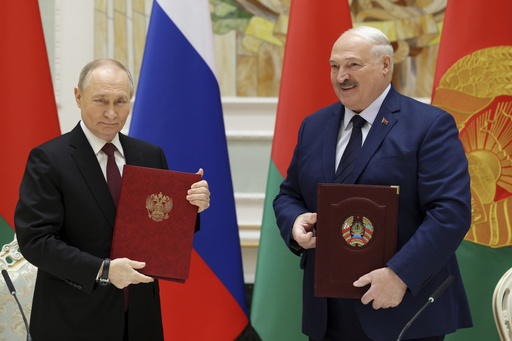
TALLINN, Estonia — In a move amid claims of increasing repression in Belarus, President Alexander Lukashenko announced the pardon of 29 political prisoners on Monday. Human rights organizations have expressed concern regarding the ongoing suppression of dissent in the nation.
The exact identities of the pardoned individuals were not disclosed by Belarusian officials. However, they confirmed that the group consisted of 11 women and 18 men, and noted that more than half of those released were living with disabilities and chronic health issues. The presidential administration stated that all individuals granted clemency had expressed remorse for their actions and sought forgiveness from the head of state.
Notably absent from this clemency are prominent opposition figures who have been out of contact for over a year. These include Ales Bialiatski, a Nobel Peace Prize winner; Siarhei Tsikhanouski, who was imprisoned while intending to run against Lukashenko in the 2020 elections; and Viktar Babaryka, who was incarcerated following a surge in popularity prior to the same elections. Other significant opposition leaders, like activist Mikola Statkevich and lawyer Maxim Znak, who have not had outside communication since late 2023, also remain in custody.
This recent amnesty represents the seventh act of pardoning by Lukashenko in a half-year span, with a total of 178 political prisoners released as reported by the Belarusian human rights group Viasna. Most of these individuals had been sentenced following extensive anti-government demonstrations that erupted in 2020 when Lukashenko was controversially re-elected for a sixth term in office.
According to Viasna spokesperson Pavel Sapelka, the pardoning of prisoners occurs amidst an intensified crackdown as the government readies for presidential elections scheduled for January 2025. “Lukashenko is sending mixed signals to the West, as the number of individuals incarcerated doubles the number of those released,” remarked Sapelka. He emphasized that repression within Belarus continues to escalate.
Political prisoners endure severely restrictive conditions, facing denial of legal counsel and family visits, alongside inadequate medical treatment while imprisoned. Viasna has reported that at least seven political prisoners have tragically died since 2020 as a result of these dire conditions.
Lukashenko, who has maintained a tight grip on Belarus for over three decades, is closely allied with Russian President Vladimir Putin. This partnership has allowed Russia to utilize Belarusian territory for troop deployments into Ukraine beginning in February 2022, and for the positioning of some strategic nuclear assets within Belarus.

